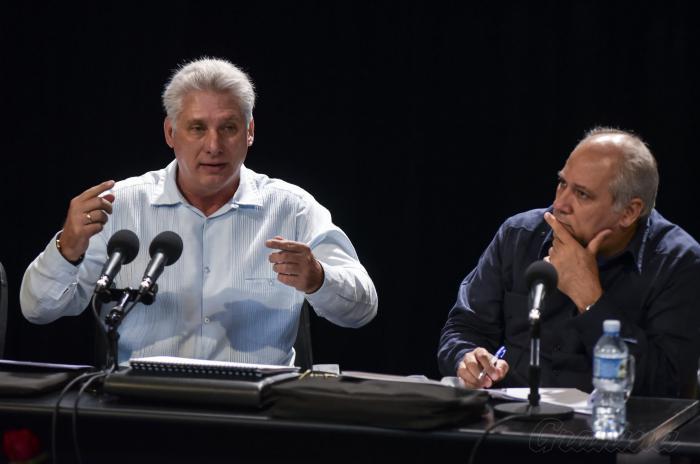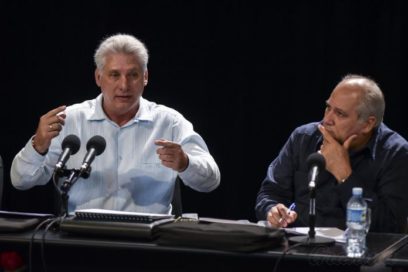Miguel Díaz-Canel Bermúdez, President of the Republic, attested to the strength that being supported by culture means for the Cuban Revolution, and the joy felt upon feeling it in song, sketches, photography and films with our very own poetics, during the Ministry of Culture’s 2019 annual review, held in the theater at the Museum of Fine Arts’ Cuban Art building, March 10.

Conscious that culture is a strength, the essence and basis of our identity, the President addressed an audience of Ministry authorities, leaders of cultural institutions and prominent intellectuals, including Esteban Lazo Hernández, president of the National Assembly of People’s Power and the Council of State; Roberto Morales Ojeda, deputy prime minister; Victor Gaute, member of the Party Central Committee Secretariat; Ulises Guilarte de Nacimiento, secretary general of Cuban Workers Federation, and Alpidio Alonso, minister of Culture.
He called for efforts to combat the philosophical war being waged against Cuba using our culture, our history and our values, «with intelligence, honesty and courage.»
After the debate prompted by the central report, which included a review of the Ministry’s work in 2019, Diaz-Canel noted that among the fundamental challenges to be faced is making greater progress in implementing agreements reached at the recent congress of the Union of Cuban Writers and Artists (UNEAC), stating, «We have set aside a regular time every month to follow up on issues raised at the congress, and have addressed culture in the media, cultural enterprises and cultural policy,» from which actions and projections are emerging.
In an aside, the President referred to the need to construct a revolutionary digital culture, which is challenging, but must be done, and stressed the need to continue insisting on efficiency in cultural enterprises; on how artists and creators are represented; and how cultural centers are managed and artists paid, in accordance with what they contribute.
Also emphasized by the President was the need to continue strengthening the role of cultural institutions, which is what will serve as the basis for solving the problems of cultural programming, noted in the annual review. This will help artistic education and efforts to develop appreciation of the arts throughout the population, he said, also referring to the importance of training a skilled workforce to provide supplies and logistical support for different art forms.
He insisted on building consensus through dialogue with artists and creators and emphasized the importance of revisiting all of Fidel’s conceptions, such as those related to art instructors, to have the greatest impact on making community cultural centers places where the population can find opportunities for spiritual development.
The President noted that, despite economic difficulties the country is experiencing, we have not suspended publishing efforts, which were seriously impacted in 2019, and insisted on the consistent implementation of cultural policy.
In conclusion, he recognized the Ministry’s contribution to two important government programs launched last year: one to combat racial discrimination, to which the experience of UNEAC’s Aponte Commission has contributed significantly, and the recreation program, which seeks to encourage more cultured ways for the population to enjoy our free time.
The Cuban President ended his remarks with a call for those charged with preserving our culture to think and act as a country. (Taken from en.granma.cu)


